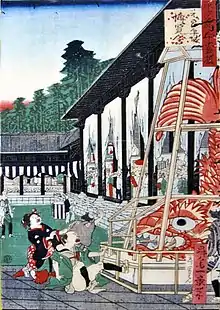| Yushima Seidō Exposition | |
|---|---|
 Ticket, advert and deposit certificate | |
| Overview | |
| BIE-class | Unrecognized exposition |
| Name | Yushima Seidō Exposition |
| Building(s) | Taiseiden Hall |
| Visitors | 192 878 |
| Organized by | Ministry of Education's Museum Bureau |
| Location | |
| Country | Japan |
| City | Tokyo |
| Coordinates | 35°42′03″N 139°45′59″E / 35.70083°N 139.76639°E |
| Timeline | |
| Opening | 10 March 1872 |
| Closure | 30 April 1872 |
The Yushima Seidō Exposition was held at Taiseiden Hall, previously a Shinto shrine. It opened on 10 March 1872, closed 20 days later and displayed more than 600 items.[1]
Context
The exhibition took place a year before Vienna's world's fair, and was used as an opportunity to collate items for both events.[1][2]
Contents
There were over 600 exhibits: cultural artefacts and natural exhibits.[1] One of the sashi from Nagoya Castle was shown, and very popular.[1]
Visitors
The Emperor visited on 13 March and the Empress on 30 March.[3] 192 878 visited in total.[3]
Legacy
After the event much of the collection was opened as a permanent museum, which lead Tokyo National Museum's establishment.[2][4]
Gallery
 Staff of the Yushima Seido Exposition
Staff of the Yushima Seido Exposition Sashi from Nagoya castle
Sashi from Nagoya castle Yushima Seido Exhibition by Ikkei Shosai
Yushima Seido Exhibition by Ikkei Shosai
References
- 1 2 3 4 "TOKYO NATIONAL MUSEUM - about TNM History of the TNM 1.Yushima Seido Exposition". Retrieved 5 June 2021.
- 1 2 "No.143 明治時代の博覧会-その効用と影響-| アーカイブズ | 福岡市博物館". Retrieved 7 June 2021.
- 1 2 "博覧会資料COLLECTION | 乃村工藝社 NOMURA : 「空間」を創り、そして活かす". Retrieved 7 June 2021.
- ↑ "Tokyo National Museum, Tokyo". Retrieved 8 June 2021.
This article is issued from Wikipedia. The text is licensed under Creative Commons - Attribution - Sharealike. Additional terms may apply for the media files.